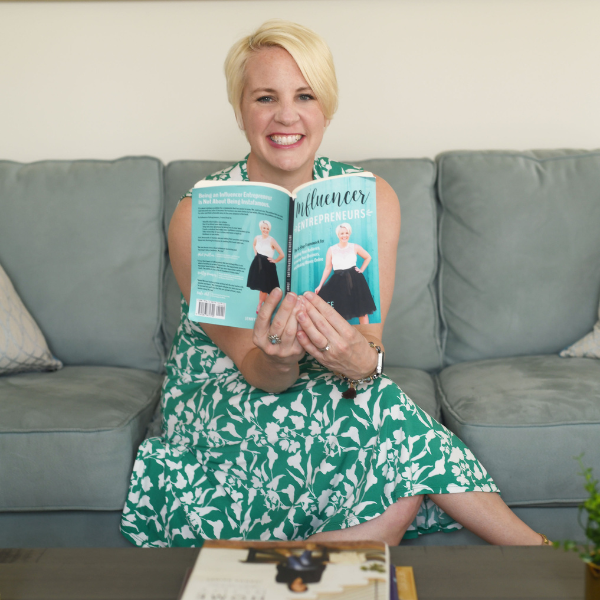Are you pitching brands for sponsored content and hearing crickets?
There are reasons that you have a failing pitch and I’m sharing insight on what they are and how to fix them.
IE 30: Why Your Pitch is Failing

Plus, be sure to join me in the Pitch Perfect Master Class! In this class I will show you the exact steps to take for pitching and landing your next big sponsor.
But first, are you reaching out to brands? If you aren’t, you are seriously limiting your own possibilities.
Is Blogging Your Hobby…or Your Business?
Is your family depending on you to actually bring in some money from this thing you do called blogging? Do you find yourself spending more money online than you earn? Do you need to move from hobby blogger to being an active contributor to your family by getting a paycheck for all the time you spend on the computer?
I understand! I remember the days of my husband laughing at me “blogging again.” It was seen as a waste of time. That is until the first paycheck came in. Then it wasn’t a hobby anymore. It was a career; a way to improve my family’s life.
Speak Up for Yourself
If you are waiting around for brands to contact you, you may be waiting a while. But what if I told you that you could have your calendar full months ahead of time by contacting the brands yourself? Not to mention having plenty of time to complete the projects you need to get done for the brands; waiting for them to contact you can leave you with only a couple of weeks to pull together a ton of content. Talk about stressful!
If you need that income to be steady, reaching out to the brands yourself is a way to fill that calendar the way you want it filled. No more trying to fit in everything that comes in at once; you can seek out the opportunities you want to pursue. Another benefit to reaching out to brands yourself is that you get more long-term contracts instead of just a bunch of one-offs.
When you reach out to brands, you are able to speak to your strengths instead of just taking the jobs that they offer. When you go through a network for your opportunities, you have to wait for all the middle-men to get their cut of the money before you get yours. But when you reach out for yourself, you can get paid what you are truly worth, with no middle-men to account for.
If you want more helpful information like this, be sure to go over to my website and get yourself on the waitlist for my course, Pitch Perfect Pro, where I tell you who to reach out to and what to say. Now, on with today’s topic!
What Is Your Mindset?
The number one issue I see in people whose pitches are failing is their mindset. Fear rules for too many people. They may not like the idea of cold calling and they aren’t confident in what they are saying. This is an issue of self-worth.
If you aren’t secure in what you bring to the table, that comes through in your pitch. If you don’t believe in yourself, why should anyone else believe in you? You need to knock their socks off in your initial pitch or you probably won’t hear back from them. What makes you unique? What can you bring to this game that no other blogger can? If you don’t say these things in your pitch, how will they know?
Go in with the mindset that they will get back to you, that they will want to work with you, and that you have something to offer that nobody else can.
It’s Not About You
If your initial pitch is all about you, expect to not hear back. While you do want to share your strengths and what you can bring to the campaign, your goal is to show the brand how those strengths will benefit them.
You need to do some research before you pitch to any brand; know what products they want to promote, what social media channels they are active on, and who their audience is. You want to have an audience that is very similar to their audience. If you have your largest engagement on Facebook but their audience is more engaged on Instagram, they probably won’t be interested in your pitch to do Facebook lives for them.
Your audience is also key here because if their audience isn’t similar to yours, they won’t be able to cross-promote the content and it likely won’t do well with your own audience. Know your audience and know theirs. Look at their website and social media channels and come to the game prepared to show them how your content will match their audience.
All That…and the Kitchen Sink
Being too specific in your pitch is not a good idea, but I have seen bloggers promise all that…and the kitchen sink to boot. They literally tell in detail every single little thing they will do as part of the campaign. Why is this not a good idea? Won’t the brands be more interested if they know exactly what you are proposing?
I like to use the example of reaching out to a company that produces flour. If, in your initial pitch, you say something like, “I will create an award-winning apple pie recipe using your flour and blah, blah, blah…”, you can expect not to hear a word back from them. Why?
Maybe they aren’t interested in apple pie. Maybe they think apple pie is overdone. Maybe they want cookie recipes. Maybe they want a campaign based on cake recipes. Whatever the reason, this is the quickest way to get nowhere in your pitch.
You want to be broad in your initial pitch. So using the flour company example, you might say, “I plan to create a recipe for a fall dessert that will remind people of home.” This is where your research comes in; if, on their website, they use language about family, dinners at the table, etc. you know what kind of language to use in your pitch.
Another reason to not be too specific is that if they don’t like your price, but they like your idea, they can take your pitch and offer your idea to someone else. If you tell them all about your award-winning apple pie recipe but they think your price is too high, they can go to another blogger and ask them to create that apple pie recipe and you lose out.
Make your initial pitch and proposal broad; only give details after the contract is signed if they ask for them.
Tell Them What to Do
If your pitch has no call to action and you don’t tell them exactly what you want them to do, they will likely do absolutely nothing.
When you send that initial pitch, don’t send your media kit or your proposal. Just send the pitch, but be sure to include a specific call to action. After the pitch, I like to say, “I would love to send you my media kit and a proposal.” This gives them the chance to tell you to go ahead and send it along.
When they ask for your media kit, they will likely expect that your media kit includes your proposal, and that’s how a lot of folks do it. But I advise another way. You should never send a proposal with one certain amount. Include a variety of prices for different packages. If you want more details on exactly how to write a proposal, be sure to sign up for my course, Pitch Perfect Pro and you will be notified when we open enrollment again.
When they ask to see your media kit, go ahead and send a separate proposal with all of your rates and packages listed. If you don’t have a media kit, be sure to head over to my website and get my training on creating a media kit that converts. I actually give you my own personal media kit that you can take and adjust and personalize for your own use.
Don’t Give Up So Fast
I hear it all the time.
“Jenny, I sent my pitch and I didn’t hear anything back.” And I always ask how many times they’ve sent it.
“What?? I’m supposed to send it more than once??”
Okay, stop for a minute. If you own a business, take a minute and think about your inbox. If it’s anything like mine, it’s crazy town. I miss things all the time simply because I am inundated with folks wanting to guest post, wanting to have me on their podcast, or brands wanting to work with me. If someone doesn’t contact me more than once, it’s likely that I won’t see it.
It’s not because I’m not interested; I don’t even know if I’m interested. It’s just that with everything involved in running my business, I can’t take respond to every single email I get proposing something.
You need to consider the PR person you are trying to reach out to. If you are reaching out to them, you should just assume that they are being reached out to by many others who want the same thing you do…a contract. So what is going to happen when you send one random email to them? It is probably going to get buried in their inbox.
I get asked what day of the week you should send your pitches; is Sunday night the best so it’s there when they get to work on Monday morning? Well, maybe and maybe not. It all depends on the person, how full their inbox is, and how often they clean it out. One of the things I highly recommend is getting an extension for your Gmail account that tells you when an email has been opened.
If you see that they haven’t opened your initial email, I would send the exact same email around 5-7 days after the first one, maybe changing the subject line. If they have opened it but haven’t replied yet, then on day 10 after you sent the original, you can try sending another email. In this one, copy and paste the original email into it, change the subject line, and open this email with an understanding of the busy schedule of the recipient.
Something like, “Hi, Bob. I wanted to be sure to get this back into your inbox. I know how hectic things are during the holidays (summer vacation, fall break, Christmas, etc.) and just wanted to be sure you saw the email I sent you last week (2 weeks ago, 10 days ago, last month, etc).” Then paste the original email content there.
So what if you still don’t hear back? Send it one more time. Yes, really.
In another 10 days, send it once more. This time, say in the beginning, “I know your inbox is probably crazy, but just wanted to get this in front of you. I look forward to hearing from you.”
That part about “looking forward to hearing” from them is very important, because it portrays that confidence you want to show, that you do actually expect them to reply to you.
Can I Give Up Yet?
Okay, you’ve sent 3 emails over a period of 3-4 weeks, you can see that they have been opened, but you still haven’t heard back. What now? Is it time to just give up on that brand? Nope. Not yet.
At this point, I wait about a month and then I try one more time. I re-write my email, including my original pitch and my updated social media numbers, and send it along one more time. If your email list has grown exponentially since your first pitch, be sure to focus on that. Did your Instagram grow by several hundred since that first email? Highlight those changes in the new email. Why bother doing this?
For starters, maybe the company just wasn’t ready to get going on a campaign at the time they got your original emails. Or maybe they don’t currently have a budget for collaborating with bloggers. There could be a variety of reasons you haven’t heard back, but give them the benefit of the doubt and send one more email.
Again, if you need help and pointers on how to create great pitches, head on over and get on the waitlist for my course. Or for a free option, request access to my Facebook group where I discuss these things LIVE for everyone in the group. You can ask questions about the podcast episodes, get more direct contact with me, and have your questions answered on a variety of topics.
Resources Mentioned
I make a portion of any sales made as an affiliate.
- Pitch Perfect Pro
- Pitch Perfect Challenge
- Pitch Perfect Master Class
- Converting Media Kit Video Training
- Pitch Perfect Cheat Sheet
Don’t Forget:
- If you liked this episode of Influencer Entrepreneurs, please subscribe and leave a fabulous review!
- You can also put a face to the voices on YouTube.
- Join the conversation on social media by using the hashtag #IEMasters



